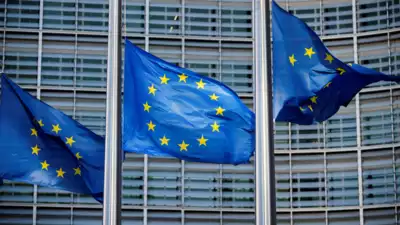On Wednesday, the EU reached a consensus to impose export bans on three mainland Chinese companies and to blacklist North Korea’s defense minister as part of new sanctions marking the second anniversary of Russia’s conflict with Ukraine, according to officials.
The latest set of sanctions—marking the 13th since Russian President Vladimir Putin’s invasion in February 2022—primarily focuses on approximately two hundred officials and entities from Russia implicated in the conflict.
Ursula von der Leyen, President of the European Commission, expressed approval of the EU’s 27 nations’ consensus on the measures, emphasizing their potential to limit “Russia’s acquisition of drones.”
“We must persist in weakening Putin’s military capabilities,” von der Leyen underscored in a statement.
Diplomats have reported that the latest sanctions include the addition of three mainland Chinese companies to a list of entities barred from conducting business with EU firms. These companies, the first from mainland China to be targeted by such measures, are accused of being involved in supplying sensitive military technology to Russia. Additionally, firms from Turkey and India have been included, reflecting the EU’s increasing focus on third countries aiding Moscow in evading sanctions.
Furthermore, as part of this new package, the EU has imposed an asset freeze and visa ban on North Korea’s defense minister, Kang Sun Nam, for allegedly supplying ballistic missiles to Moscow.
Over the past two years of conflict, the EU has placed unprecedented sanctions on Russia, with around 2,000 officials and entities already blacklisted. Despite these economic measures, Russia’s economy has shown resilience, allowing the Kremlin to intensify military production.
As the second anniversary of the invasion approaches, Ukrainian forces are experiencing setbacks on the battlefield, while uncertainties loom over the future of support from the United States, a key ally.
